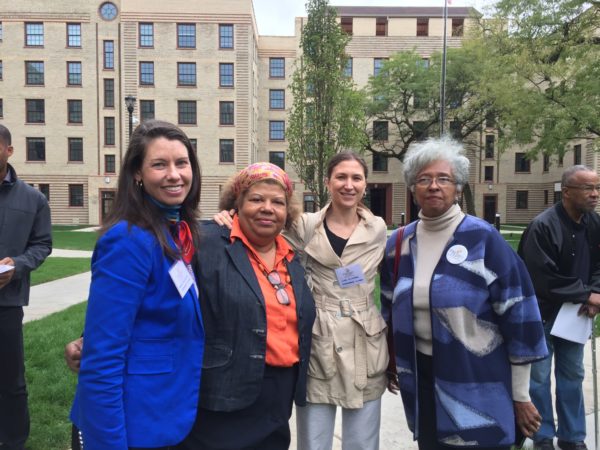4648 S. Michigan Ave., Chicago
In September 2016, after years of advocating for the Rosenwald Court Apartments, formerly known as the Michigan Boulevard Garden Apartments, Landmarks Illinois joined public officials and community representatives in celebrating the grand reopening of the rehabilitated, historically significant housing complex in Chicago’s Bronzeville neighborhood.
Rosenwald Court Apartments’ Historic Past
The original 421-unit, Art Moderne-style residential building complex was built in 1929. Commissioned by the socially conscious philanthropist and Sears, Roebuck & Company Executive, Julius Rosenwald, the complex was intended to provide sound housing for the growing black middle class and provide a small return on investment for Rosenwald. According to AIA Guide to Chicago (1993), Rosenwald’s inspiration for the development was post-World War I municipal housing in Vienna. The Architect was his nephew, Ernest A. Grunsfeld, Jr. (architect of Adler Planetarium) and his son-in-law, Alfred K. Stern, was in charge of the development.
“For decades the apartments were extremely attractive to working-class renters, but profit was only 2.4 percent over seven years on a $2.7 million investment,” the AIA Guide to Chicago states. “After Rosenwald’s death in 1932, Stern conceded that low-income housing needed government support.”
In 1973, the complex was sold to the Chicago Department of Urban Renewal and ownership eventually transferred to the Chicago Housing Authority (CHA). The Rosenwald complex housed both Section 8 and many displaced residents from the Robert Taylor Homes – a nearby public housing complex that was demolished. CHA later vacated the building and the complex closed in 1999. For years, the complex would sit vacant and deteriorating under ownership of the City of Chicago, which had no plans for rehabilitation for the buildings.
Advocacy Efforts
For the nearly two decades following CHA’s departure from Rosenwald, community residents, led by a fiery and determined activist named Bobbie Johnson, Landmarks Illinois, the National Trust, Preservation Chicago, the Bronzeville Community Development Partnership, Urban Land Institute and many others advocated for preservation over demolition of this important neighborhood anchor.
In 2002, as Rosenwald faced the ongoing threat of demolition, Landmarks Illinois included the complex on its Most Endangered Historic Places in Illinois list. A year later, the National Trust for Historic Places also called attention to the apartment complex by placing it on its America’s 11 Most Endangered Historic Places list.
Complex Saved From Demolition
The Rosenwald Apartments were ultimately saved from demolition and preserved. On Oct. 4, 2016, the rehabilitation and reopening of the Rosenwald Court Apartment complex was unveiled. The lead developer, Landwhite Development LLC, had completed an ambitious $132 million rehabilitation of the historic complex providing 235 one- and two-bedroom units for senior and family housing, with restored landscape in the inner court and refurbished retail spaces lining Wabash and 47th streets. The project utilized an intricate layering of multiple important tax incentives, including federal historic tax credits, low-income housing tax credits, tax-increment financing and a loan from the CHA.
Third Ward Alderman Pat Dowell helped bring much of the city’s public dollars to the rehabilitation project. At the ribbon cutting ceremony, Dowell pointed out how Rosenwald’s reopening coincided with the 100-year anniversary of the Great Migration.
“What more befitting tribute to this time in history than a celebration of the restoration of the iconic and historic Michigan Boulevard Apartments,” Dowell said.
(Photo: Landmarks Illinois President & CEO Bonnie McDonald; President of Bronzeville Community Development Partnership Paula Robinson; Landmarks Illinois Director of Advoacy Lisa DiChiera; Former Landmarks Illinois Board Member Yvette LaGrand)

